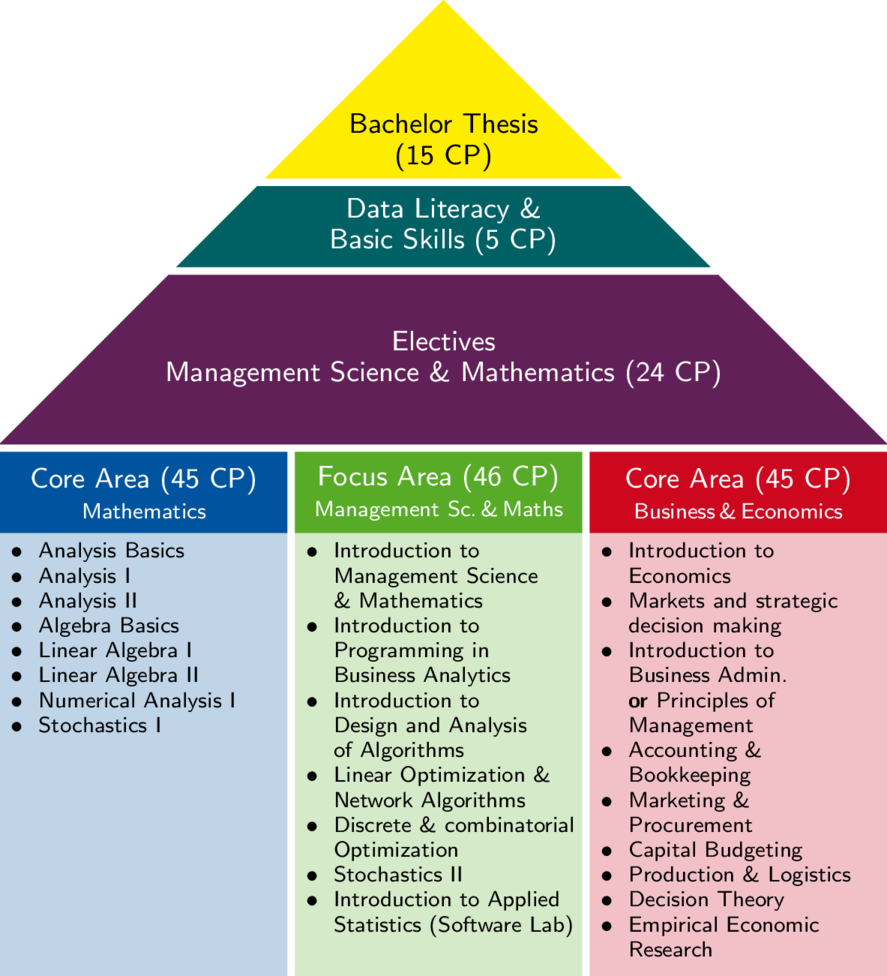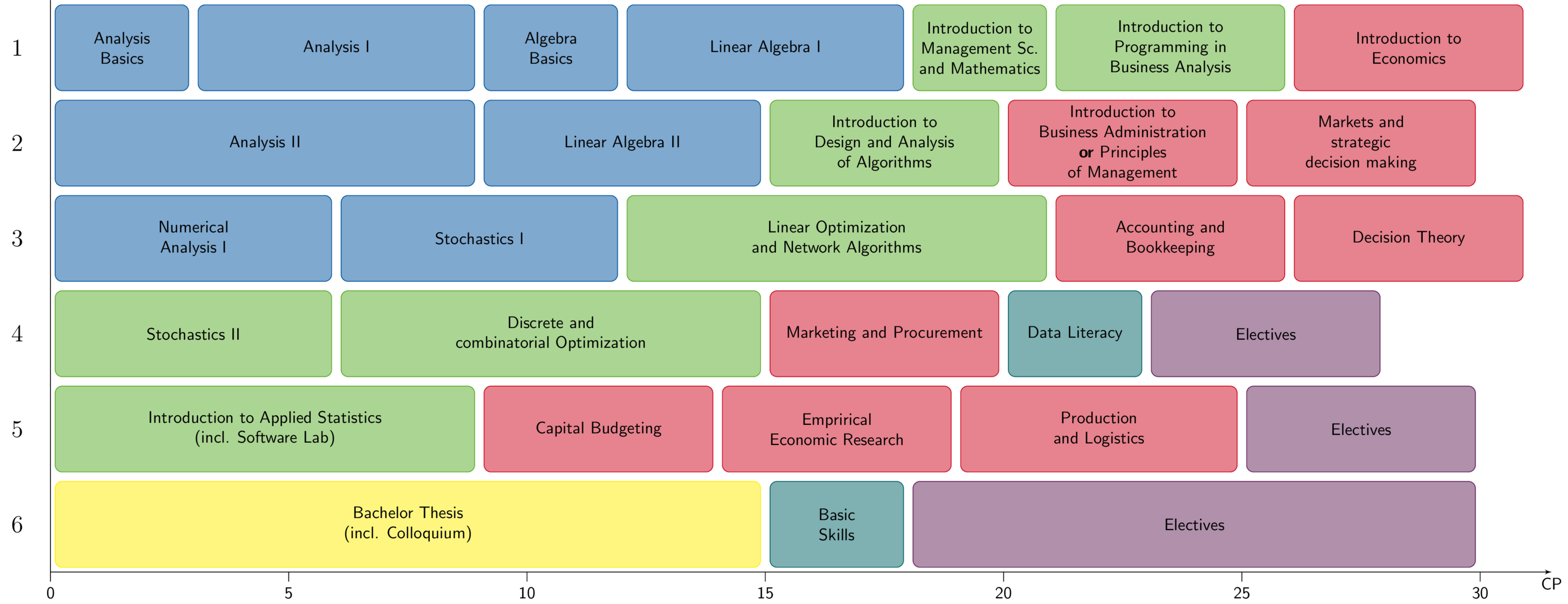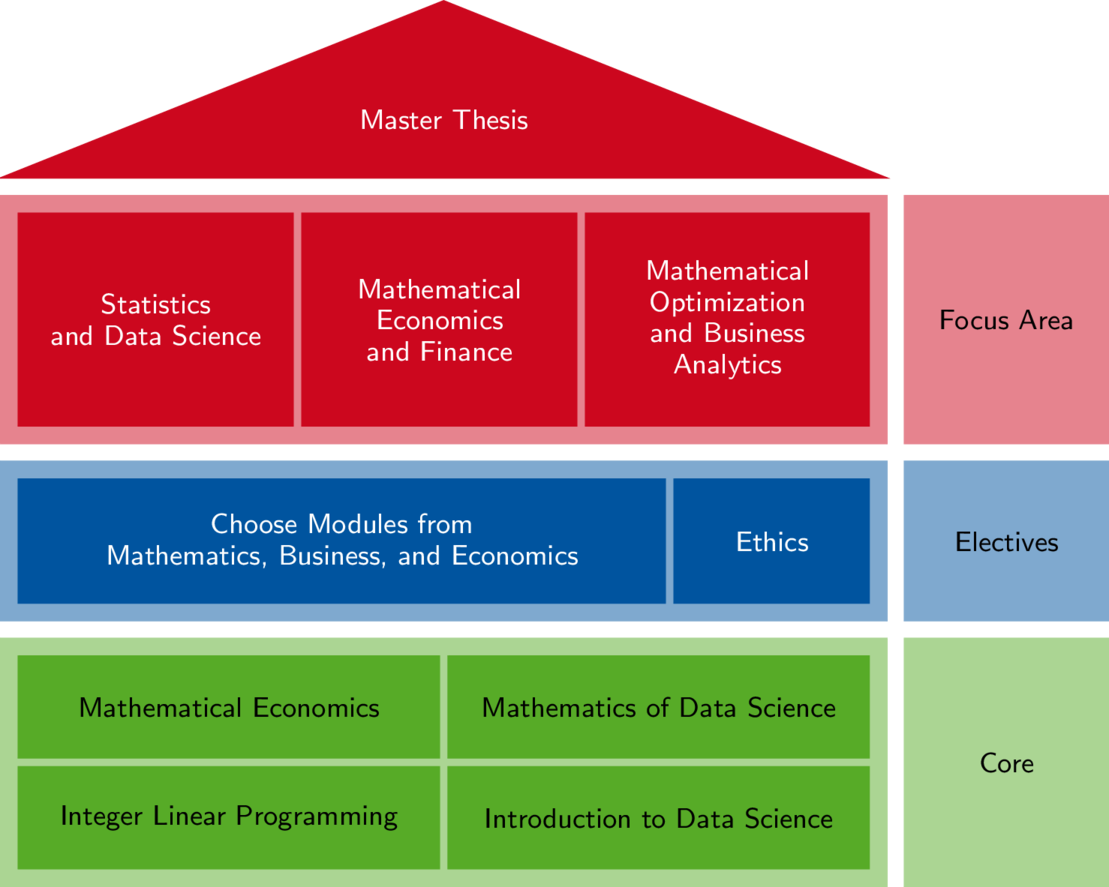Management Science and Mathematics
at the RWTH Aachen University
The new degree programs “Management Science and Mathematics” (B.Sc., in German) and “Management Science and Mathematics” (M.Sc., in English) at RWTH Aachen University
Digitalisation continues to advance. Data is becoming the most important currency for large companies. This data needs to be analysed using suitable mathematical models and the best possible conclusions need to be drawn for the company. Decisions should no longer be made solely on the basis of personal experience and ones gut feeling. Instead, objective mathematical analyses answer the company’s questions about the future. Which new product ideas should be realised on the basis of demand forecasts, financing options and the general market situation? How can additional production be integrated into the existing production program plan at the lowest possible cost without compromising on fixed delivery dates? Are new production and sales locations necessary and where should they be located?
These are the challenges faced by the Bachelor’s degree program in Management Science and Mathematics and the Master’s degree program in Management Science and Mathematics at RWTH Aachen University. In the modern and interdisciplinary degree programs you will learn to solve economic, business and social problems using mathematical models and methods. You will learn a scientific way of working as well as a reflected categorisation of data and findings. In addition to traditional methods from applied mathematics and economics, innovative computer-aided methods are used. Special emphasis is placed on mathematical optimization and modelling as well as statistics. We also prioritise methodological elements and a broad basic orientation.
Had business maths existed in my time: I would have studied it. The degree program brings together two things that belong together: The economic expertise to recognise which problems are currently important for business, and the mathematical competence to find good, evidence-based and objective solutions.
Felix Engelhardt – Student Mathematics Master
Study, in order of
making clear statements.
Study program and modules – what you can expect in the Bachelor’s program
Bachelor’s program Management Science and Mathematics
- Demanding mathematical program of studies
- Interdisciplinary study with excellent prospects
- Strong in theory and applications
- Focus on mathematical economics, optimization and statistics
The compulsory area of the Bachelor’s degree program in Management Science and Mathematics consists of three pillars: Mathematics, Economics and Management Science. In the basic area of mathematics, you will learn basic mathematical structures and techniques. In the basic area of economics, we discuss fundamental business and economic issues and models.
At the heart of the degree program is the specialisation in management science and mathematics . Here you will learn to model economic issues mathematically and analyse them using methods from applied mathematics and economics. A particular focus is on optimisation/management science and statistics/econometrics. Computer-based methods also play a major role here, which is why programing languages such as Python and R will be taught.

In the second half of the degree program, you can choose from an extensive range of compulsory elective courses and have the opportunity to integrate a company internship or to complete a semester abroad. Together with the Bachelor’s thesis, this gives you the opportunity to organise your studies according to your own interests, develop soft skills and thus create your own individual profile.
Teachers, tutors and the student advisory service will help you to overcome the challenges of your degree program. You will be supported by mentors in finding and implementing solutions to problems during your studies.

A company internship can easily be integrated into your degree program via the Practical elective module. We support you in your search for an internship and accompany you during your internship phase using our contacts with business and industry.
The 3rd year of study (fifth or sixth semester) with its many compulsory elective modules is particularly suitable for semesters abroad. Contacts and cooperation between RWTH and foreign universities are constantly being expanded. This applies in particular to the interdisciplinary field of management science and mathematics .
Many economic processes have mathematical structures. At INFORM GmbH, we discover such structures and use mathematical and computer science methods to contribute to efficient planning and control in various economic fields. An in-depth understanding of mathematics and economic interrelationships, as taught in the Management Science and Mathematics degree program at RWTH Aachen University, is an indispensable basis for our company’s success.
Dr. Thomas Wensing – INFORM GmbH, Optimierungsspezialist
Study programme and modules – what you can expect in the Master’s program
Master’s program Management Science and Mathematics
- Demanding program of studies with mathematical focus
- Interdisciplinary study with excellent prospects
- Strong in theory and applications
- Focus on mathematical optimization and business analytics, statistics & data science, mathematical economics and finance
The Master’s program is divided into a core area, an elective area and an advanced area. In the core area, methodological skills from the fields of optimization and operations research, statistics and data science and mathematical economics are taught. For each of the three specializations, there is an associated basic module that teaches the fundamental models, notations, methods and implications for organizations and society. In addition, the core area includes the computer science module “Introduction to Data Science”, which provides a comprehensive overview of the subject of Data Science as well as the compulsory elective area “Ethics”.
In the elective area, you have the opportunity to choose freely from the module catalogs of the Master’s degree programs in Mathematics and Management Science. This offer gives students the opportunity to explore other areas of economics and mathematics according to their interests.
In the advanced area, modules from the following three specializations must be selected:
- Mathematical Optimization and Business Analytics
- Statistics and Data Science
- Mathematical Economics and Finance
One of these areas must be chosen as a focus area. The modules selected in the advanced area form the basis for the master thesis.

Interested students on this Master’s degree program have the opportunity to spend a semester abroad. Ideally, this should take place in the third semester.
Students also have the opportunity to study at other universities as part of the Erasmus program, for example in Greece, Great Britain, Italy, Poland or Spain. In addition to the faculty-specific study abroad programs, RWTH students also benefit from the university’s strategic partnerships with international universities. For example, they can complete short stays at one of the IDEA League universities as part of their coursework. The UROP Abroad program, which is unique in Germany, offers the opportunity to participate in research projects at international universities. These stays abroad are partly funded by RWTH-specific financial aid.
Study, to see the
bigger picture.
Frequently Asked Questions – FAQ

What career prospects do I have?
Thanks to your interdisciplinary training, you will be able to solve practical problems using mathematical and IT methods, taking economic requirements into account. This special interdisciplinary qualification opens up a broad professional spectrum for you.
Classic sectors for business mathematicians are the finance and insurance industry as well as management consultancy and the IT sector. However, your skills will also be in demand in other business areas that require a critical-analytical mindset and a good understanding of mathematical methods and algorithms. These include, for example, the optimisation of production and logistics processes, controlling and corporate management as well as the statistical analysis of large data sets (Big Data).
Thanks to your expertise in quantitative methods and your interdisciplinary training, you will have excellent opportunities on the labour market. The demand for highly qualified specialists with core competencies in the fields of mathematics and economics as well as good knowledge of statistics and optimisation is high and constantly increasing.

Which qualification will I receive?
Graduates of the Business Mathematics degree programme are awarded the Bachelor of Science degree.
Upon successful completion of the Management Science and Mathematics degree programme, you will be awarded the Master of Science degree.

What happens after the Bachelor’s degree?
The M.Sc. Management Science and Mathematics directly follows after the B.Sc. in Business Mathematics. Alternatively, you can continue your studies in the Master’s program Data Science. However, in that case you need the modules Analysis III and Numerical Analysis II. If these were not completed so far, they are currently issued as requirements for admission to the MSc. Subject to certain conditions, it is also possible to study the Master’s programmes Business Administration and Mathematics.
This provides you with a highly interesting portfolio of further study options. It enables you to continue your studies according to your own interests and abilities. All Master’s programmes are research-oriented and offer doctoral prospects in mathematics, statistics and economics.
Although we recommend completing a Master’s programme, the comprehensive basic training means that you can also start your career directly with a Bachelor’s degree in Business Mathematics.

I am not an EU citizen. What do I need to consider?
Students from outside the EU are very welcome. You will be supported by our International Office. You can find all the information you need there.

What language skills do I need?
German language skills are required for enrolment on the Bachelor’s degree programme in Business Mathematics. If you have not completed a German Abitur or have not learnt German as a native language, you must provide proof of the required command of the German language. Individual courses may be held in English. If you wish to complete your internship abroad or later work abroad, you may need additional or more extensive language skills. You will have the opportunity to attend language courses during the course of your degree programme.
The Master’s degree programme in Management Science and Mathematics is predominantly taught in English, which is why proof of proficiency in English must be provided. The overarching examination regulations in section I § 3 paragraph 9 regulate the details. For example, it is sufficient to have taken English at a German school up to and including the qualification phase 1 (Q1) and to have completed it with at least sufficient grades.

How do I enrol?
Enrolment takes place at the RWTH Student Secretariat. You can find out the enrolment times and all the necessary formalities there.

When does the programme start?
You can always start the Bachelor’s degree programme in Business Mathematics in the winter semester. This begins on 1 October each year.
The Master’s degree programme in Management Science and Mathematics will be offered for the first time in the winter semester 2024/2025. You can then start your Master’s degree programme in the winter or summer semester.

Are there any prerequisites for the Bachelor’s degree programme in Management Science and Mathematics ?
You need an Abitur or a comparable university entrance qualification (HZB). The programm is in German.
Do you have any further questions?
Would you like to find out more about this degree programme? Our student advisory and counceling will be happy to help you with all your questions:
Academic Advising for the mathematical aspects:
Diana Rauwolf
Dr. rer. nat., Lehrkraft für besondere Aufgaben
Erhard Cramer
Dr. rer. nat., Universitätsprofessor
Institut für Statistik und Wirtschaftsmathematik
Wüllnerstr.3 / Raum U 102 (Rauwolf)
Pontdriesch 14 – 16 / Raum 313 (Cramer)
52062 Aachen
Telefon: +49 241 80 94850 (Rauwolf)
Telefon: +49 241 80 94572 (Cramer)
E-Mail: studienberatung.wima@mathematik.rwth-aachen.de
Website: www.isw.rwth-aachen.de
H
H
H
Academic Advising for the business aspects:
Janny Franken-Vogts
Dipl.-Kff., Studienberatung und Prüfungsmanagement
Britta Peis
Dr. rer. nat., Universitätsprofessorin
Lehrstuhl für Management Science (Peis)
Kackertstr. 7 / Raum B222
52072 Aachen
Studienberatung und Prüfungsmanagement (Franken-Vogts)
Templergraben 64 / Raum 623
52056 Aachen
Telefon: +49 241 80 96211 (Franken-Vogts)
Telefon: +49 241 80 93392 (Peis)
E-Mail: franken@wiwi.rwth-aachen.de
Website: www.oms.rwth-aachen.de






